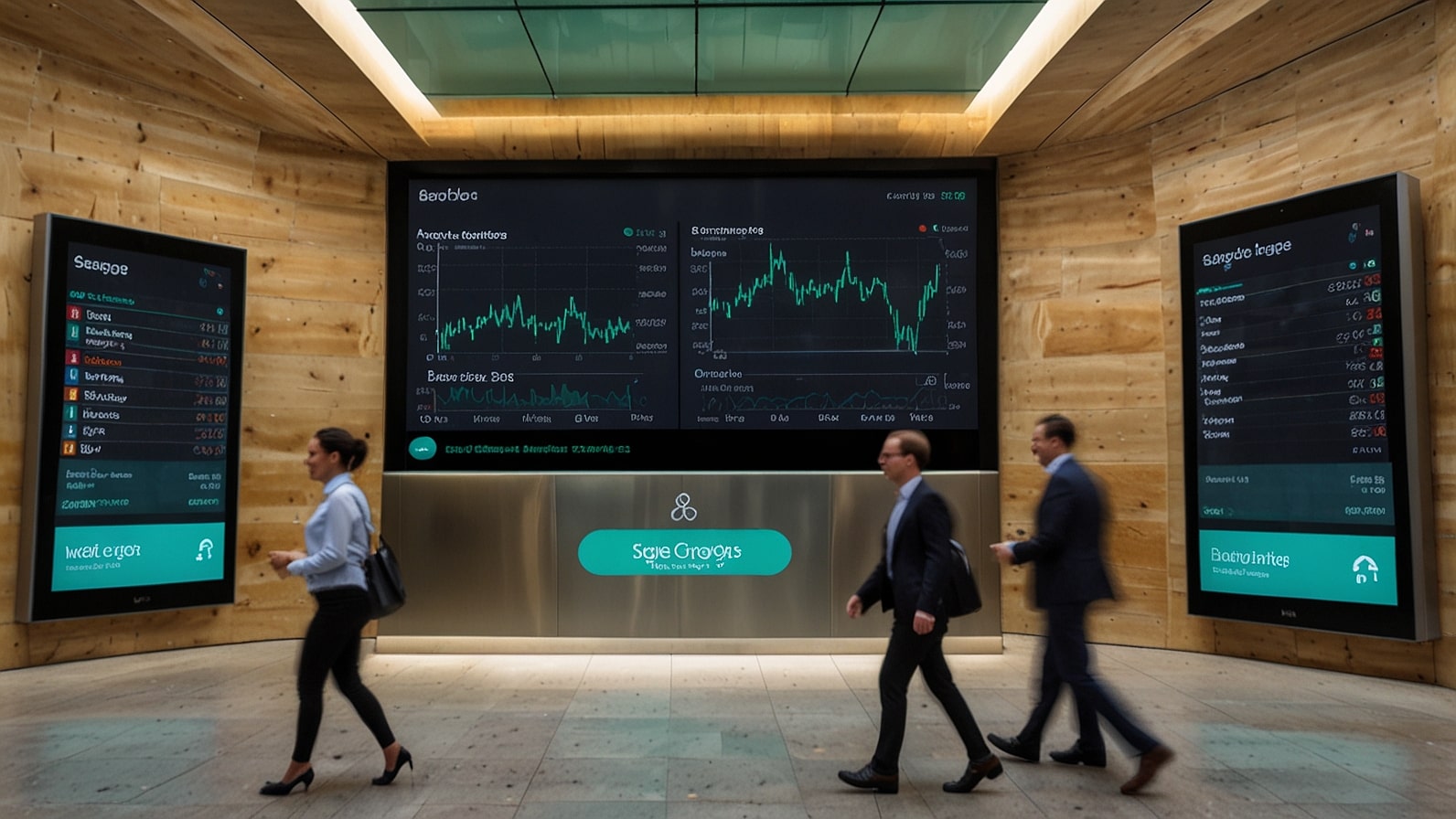
Sage’s AI-Powered Accounting Suite Launch Sparks FTSE 100 Rally, Shares Climb 3% on Citi Upgrade
London, October 13, 2025 – Sage Group plc, an accounting software industry leader based in Newcastle-upon-Tyne, launched its latest generation AI-enabled platform today, sending a tsunami of its stock and dragging the FTSE 100 to unprecedented heights.
The shares increased by 3.2% to PS120.45 in early trade after a bullish note by Citi analysts, which saw the launch of Sage AI Insights, a program that will automate financial forecasting and compliance among small and medium enterprises.
With a wider market recovery following the sell-off of Friday due to tariffs, the innovation of Sage highlights the UK technology strength, which compares to the 15% YTD returns by the industry.
The FTSE 100, which had dropped by 0.86 per cent to 9,427 last Friday, dropped 0.5 per cent by midday to 9,480, boosted by defensive buying such as Sage against the last U.S.-China trade bets.
As equities around the world fluctuated due to Trump’s threats of tariffs, companies with software names that offer growth and are recession-proof saw investors flock to them. Old school heavyweight, Sage, which has a market capital of over PS38 billion, is now in the front line, with its shares increasing by more than 14 per cent a year, compared to the index.
Sage AI Insights: The Future of the SME Finance
Fundamentally, Sage AI Insights will be applied in the basic functions of accounting and attempts to predict cash flow interruptions with 92% accuracy and identify tax anomalies in real-time through machine learning.
The suite, which runs on the Intacct cloud by Sage, aims at the 6 million UK SMEs that are struggling with post-pandemic rebuilding and regulatory uncertainty. It has automated VAT reconciliation as per Making Tax Digital regulations, and generative AI to create custom financial reports, which reduces manual hours by up to 70%.
Its implementation is based on an R&D of PS200 million and collaboration with Microsoft Azure to implement AI on a large scale. CEO Steve Hare heralded it as a breakthrough to autonomous finance, fixing pains in areas such as late payments, which cost UK businesses PS8.3 billion yearly.
Retail and building 500 beta users are touting 25% efficiency improvements, which puts Sage to win a piece of the PS50 billion worldwide accounting software sector, increasing at a 12% CAGR.
This technology is in line with the UK digital economy drive, of which the growth strategy of the Labour Party looks at PS1 trillion of technological production by 2030. In the case of Sage, it does not rely solely on its traditional desktop solutions, but 80% of its revenues are coming through cloud subscriptions, versus 60% in 2023.
The action will counter the threat of competitors such as Intuit and Xero in the United States, as Sage will have a strong presence in Europe-45% of its sales in continental markets.
Upgrade Citi: Fueling Investor Optimism
The reiteration of a buy rating with a PS135 target by Citi, which suggested a 12% increase, mentioned the AI momentum of Sage as one of the factors. Analysts project 11% revenue growth to PS2.2 billion by fiscal 2026 and an increase in EBITDA margins to 32 per cent on cost efficiencies.
The note points to Sage having a 98% recurring revenue stream, which offers stability in the volatile markets, and the possibility of a bolt-on acquisition in AI in payroll. In 5 years, the stock has increased by two times, making PS10,000 worth PS20,500, which includes dividends.
The current pop is the largest single-day increase since July, and the volume was 50 per cent above average. Sage crushes FTSE tech laggards: Darktrace up Flat, Softcat Up 1%. The 1.8 yield and 28x P/E imply that it is priced at a premium based on growth, which is an average of 12x on the FTSE.
There are still challenges: GDPR-based data privacy and AI ethics can be fined, and SME spending can be hit by the economic slowdown. However, Sage has PS1.5 billion cash reserves that support resiliency, such as a recent PS100 million share repurchase.
Sector Ripples and FTSE Momentum
Convatec, AstraZeneca, and its UK tech company, Sage, buzz in the UK, echoing the U.S. R&D promise by Convatec and its listing pivot. The FTSE technology sub-index improved by 1.2, and it was offset by the 11th month of manufacturing contraction, according to S&P PMI. PMI of services at 52.8 is an indicator of vigour, which favours the demand for software.
Wider picture: Asian markets and the U.S. futures are up 0.3% after Columbus Day, overcoming the tariff phobia. In energy, Brent at $72 helps, but in the rise of Sage, Non-cyclicals are outstanding. The chances of the Bank of England reducing rates to 3.75 per cent by December support growth stocks.
Prospect: AI as the Engine of Growth of Sage
The Q2 November 12 results will describe AI uptake, and it will recommend 10-12% organic growth. Analysts project PS3 billion revenue in 2028, which is enabled by 20 per cent AI penetration. To investors, Sage is a defensive bet in uncertainty, combining stability and innovation.
Sage is an example of the tech shift in Britain as FTSE looks at 9,500. With the modern trade wars, an homeless software is a bright thing, and AI is not simply a hype, it is a key to FTSE leadership that Sage can reach thanks to AI.



 Bitcoin
Bitcoin  Ethereum
Ethereum  Tether
Tether  XRP
XRP  USDC
USDC  Solana
Solana  TRON
TRON  Lido Staked Ether
Lido Staked Ether  Cardano
Cardano  Avalanche
Avalanche  Toncoin
Toncoin